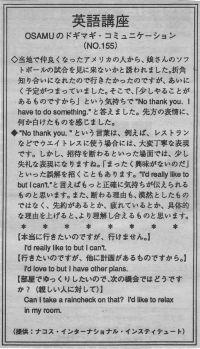行きたいのですが。
Joshua's case
For the past couple of years, I have been working at a restaurant. One of the good things about working at a restaurant is that it makes your schedule very flexible. If you need to make some extra money, you can most likely pick up other people's shifts and if you are unable to work, you can most likely find somebody to cover your shift. The only bad part is that you also get a lot of people asking to cover their shifts. This is the part that I hate because I don't like working when I don't have to. So when people ask me to cover their shifts, I usually have to come up with a white lie to have an excuse not to work. I do this because it's hard for me to say no to them without having a reason, so I come up with something. Sometimes, I really do have something to do when they ask me to work but usually that is not the case. So if somebody asks me to work for them, I usually say, “I'm sorry but I already have something planned that day” or “I would but I can't because I have a dinner tonight”. It sounds bad but in a way, I don't want to be flat out rude and say “No I don't want to work” so instead I come up with a small lie. It's my polite way of saying “No I don't want to”.
行きたいのですが。
Osamu's case
当地で仲良くなったアメリカの人から、娘さんのソフトボールの試合を見に来ないかと誘われました。折角、知り合いになれたので行きたかったのですが、あいにく予定がつまっていました。そこで、「少しやることがあるものですから」という気持ちで、/No thank you. I have to do something./ と答えました。先方の表情に、何か白けたものを感じました。
No thank you. という言葉は、例えば、レストランなどでウェイトレスに使う場合には丁寧な表現です。しかし、招待を断わるといった場面では、少し失礼な表現になりますね。
「まったく興味がないのだ」といった誤解を招くこともあります。I'd really like to but I can't. と言えばもっと正確に気持ちが伝えられるものと思います。また、断わる理由も、漠然としたものではなく、先約があるとか、疲れているとか、具体的な理由を上げると、より理解し合えると思います。
行けません。行きたいのですが・・・
I'd really like to but I can't.
行きたいのですが、他に計画があるものですから。
I'd love to but I have other plans.
部屋でゆっくりしたいので、次の機会ではどうですか?(親しい人に対して)
Can I take a raincheck on that? I'd like to relax in my room.


